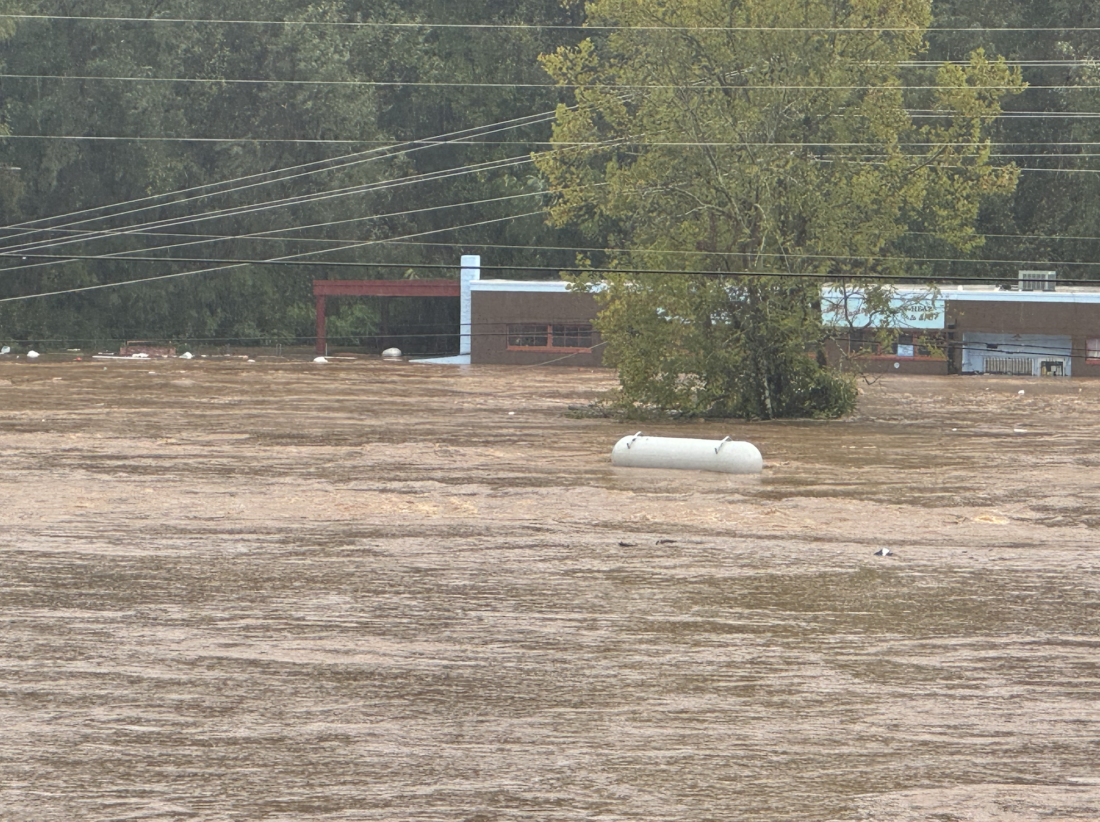The N.C. Emergency Management Joint Information Center confirmed Oct. 4 that state and federal agencies have received reports of potentially toxic mud on the banks of the French Broad River in Madison County near Marshall.
“DEQ and other state agencies have received a report about general concerns related to mud mixed with potential solid waste in the area near Marshall in Madison County and emergency officials have visited the area. However, there is no specific information about a release,” said Josh Kastrinsky, deputy communications director for N.C. Department of Environmental Quality (DEQ).
In the aftermath of Tropical Storm Helene, rumors were flying on social media and around North Buncombe and Madison counties about dangerous toxins in the water and mud along the banks of the river.
Woodfin Mayor Jim McAllister said he had fielded many calls from residents concerned about potential pollution from the Silver-Line Plastics plant in Woodfin spilling into the river after its facility was significantly damaged in the catastrophic storm. He said Silver-Line has not let town officials on its site as of Oct. 4.
“We are assuming many chemicals have washed into the river. We have contacted state and county officials, and they have promised a hazmat inspection team,” he said.
After multiple efforts to contact local Silver-Line officials, Xpress got a response from Silver-Line’s parent company IPEX, which is based in Canada.
“Unfortunately, IPEX’s Silver-Line Plastics plant in Asheville, N.C. was severely impacted by Hurricane Helene. Since then our focus has been to ensure the safety and well-being of our 304 employees in the area. We have been in touch with our Asheville colleagues and remain fully committed to supporting them throughout this challenging time,” said Anastasia Georgakakos, communications business partner for IPEX, in an email.
“In terms of the raw materials stored in our plant, while we are currently assessing, we are not aware of any leakage of materials external to our plant,” she added.
“As of late this week we have authorized personnel on site to assess the full extent of the situation and determine how and when we will begin restoration efforts. We are also currently collecting any pipe that was stored outside and washed off-property.”
Generally, in the aftermath of a storm, residents should use caution when interacting with any unknown substance, DEQ’s Kastrinsky said. He recommended that locals who want to help with clean-up efforts should follow the advice of local officials.
In a 4 p.m. media briefing Oct. 4, Buncombe County Manager Avril Pinder assured residents that the U.S. Environmental Protection Agency is working to conduct water and soil testing of areas thought to be dangerous after the storm.
“If you have concerns, please exercise an abundance of caution. This is not the time to do stream cleanups unless you are a part of an official organization or agency. We know that a number of materials were swept into the rivers, from industrial facilities, houses, farms and more. We all want to restore our community back to its natural beauty as quickly as possible. But please hold off until we have assurance from the experts that it’s safe to do so,” she said.






Before you comment
The comments section is here to provide a platform for civil dialogue on the issues we face together as a local community. Xpress is committed to offering this platform for all voices, but when the tone of the discussion gets nasty or strays off topic, we believe many people choose not to participate. Xpress editors are determined to moderate comments to ensure a constructive interchange is maintained. All comments judged not to be in keeping with the spirit of civil discourse will be removed and repeat violators will be banned. See here for our terms of service. Thank you for being part of this effort to promote respectful discussion.